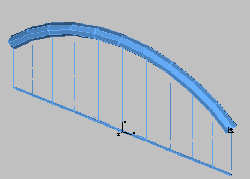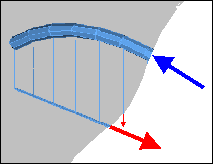



Lab 3: Cantilevered Equilibrium (PartII)
The Problem
The problem presented by this lab is to analyze the sculpture created in Lab 2 and to predict the greatest weight that the could be carrried.
The Objectives
The primary objective of this exercise is extend and exercise the graphical analysis techniques learned to date. The secondary objective is to project methods of optimization of the sculpture through the elimination of superfluous elements or geometrical adjustments. The specific objectives of this lab are:
- to evaluate the efficiency of the original structure
- to analyze the equilibrium of the sculptures graphically
- to analyze the sculpture relative to the equations of equilibrium
 The Process
The Process
1. As a group, determine ways to optimize your sculpture. If optimization is deemed possible, use the digital camera to record the "before" and "after" states of the sculpture. One person should be designated by the group to document the reasons for the changes that were ultimately made to the structure by the group.
2. Determine the weights for the kit of parts:
- Weight of foamcore base: ####
- Weight of each cube: 300 grams
- Weight of rectangular block: ####
- Weight of each wooden dowel: ####
- Weight of steel dowel: ####
- Weights of other pieces are negligible
3. Estimate how heavy the "hanging" cube could be before the sculpture would have a stability failure (overturning). Keep in mind that you are primarily looking at the system as a whole and not the specific pieces in this part of the problem.

4. Describe with graphic statics the behavior of the structural system. Can this method be used to predict the overturning failure?
5. Consider the following questions:
- Where do you think the system of the sculpture would fail?
- Is this a strength or stability failure?
- What are the relative magnitudes of the internal loads?
- How could you increase the extension of the block with the least amount of material?
The Documentation
The lab report to be submitted should contain:
- a written verbal description, with illustrations, of the changes that were made to your structure.
- an explanation of the rational for these changes
- the maximum weight of the block that could be held by the structure with supporting calculations
- a comparison of the effectiveness of the two analysis/modelling techniques (numerical and grpahical)
The Evaluation
The evaluation will be based upon the clarity and degree of completion of the lab report. It will also depend upon the accuracy of the modeling techniques and lucid description of each of their limitations.
Copyright © 1995, 1996, 1997 by Chris H. Luebkeman
 The Process
The Process